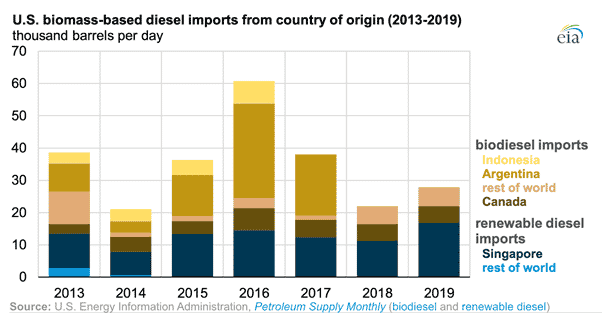U.S. Biomass-Based Diesel Imports Rose by 26 Percent in 2019: EIA

U.S. biomass-based diesel imports increased by 26 percent in 2019 to more than 27,000 barrels per day after three consecutive years of decline, according to a June 2 report from the U.S. Energy Information Administration.
Production of biomass-based diesel, which refers to biodiesel and renewable diesel, is largely driven by federal and state policies as it is more expensive to produce compared to petroleum diesel. The agency attributes the increase in 2019 imports to the rise in renewable diesel imports from Singapore, which grew by 49 percent to a record of almost 17,000 b/d last year.
Singapore has become the only source of U.S. renewable diesel imports since 2015. All of these imports have entered California since 2016 for compliance with the state’s Low Carbon Fuel Standard, or LCFS, program because of the fuel’s low carbon intensity and favorable greenhouse gas reduction score.
The fuel also qualifies as an advanced biofuel under the U.S. Environmental Protection Agency’s Renewable Fuel Standard, or RFS, program, which sets annually increasing blending mandates for renewable fuel use in the transportation sector to reach 36 billion gallons by 2022.
U.S. biodiesel imports in 2019 mostly came from Canada, which contributes to a total of 5,100 barrels per day, while the remainder came mostly from European countries. The total amount of biodiesel imports were more than 11,000 barrels per day in 2019, which remains similar to 2018 levels, but lower than previous years. Although the increasing RFS targets calls for more biomass-based diesel consumption, imports from Argentina and Indonesia have decreased from a total of 13,233 barrels per day in 2016 to zero in 2018 and 2019 because of U.S. imports duties.
The U.S. also produces and exports biodiesel to other countries, among which Canada is the key trading partner. In 2019, the U.S. exported 7,400 barrels of biodiesel per day to Canada, increasing by 10 percent from 2018. Canada accounts for more than 90 percent of the total exports of the U.S. biodiesel.
EIA estimates that net imports of biomass-based diesel will increase by 25 percent in 2020 and by 56 percent in 2021 because of the increasing demand of renewable diesel imports to California to meet its low carbon fuel standard. The total amount of domestic biodiesel production in 2020 will be about the same in 2019, according to the administration.
Both biodiesel and renewable diesel are refined from various fat, oil, and grease:
- Biodiesel is a mixture of chemical compounds named alkyl ester and can be combined with petroleum diesel at different levels, usually a blend of 5 percent to 20 percent, or B5 to B20.
- Renewable diesel, however, is composed of hydrocarbon, which is chemically similar to petroleum diesel and thus can be blended into petroleum diesel at higher blend levels without any blending limitations.
EnerKnol Pulses like this one are powered by the EnerKnol Platform—the first comprehensive database for real-time energy policy tracking. Sign up for a free trial below for access to key regulatory data and deep industry insights across the energy spectrum.
ACCESS FREE TRIAL